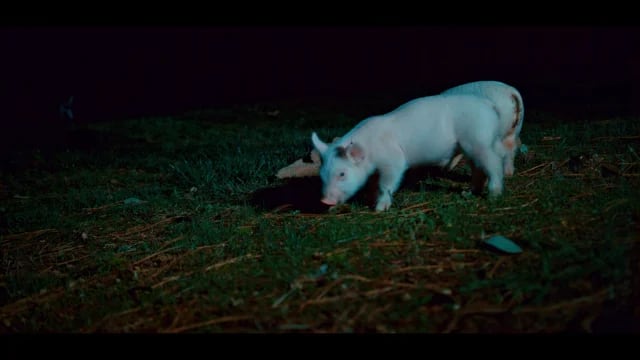In 2015, pig farmer Susan Monica was convicted of killing two men on her farm outside the community of Wimer in Jackson County, Ore. Monica, who also dismembered her victims and fed their bodies to her pigs, all but admitted to the crimes in court—and is currently serving 50 years at Coffee Creek Correctional Facility near Wilsonville.
This year, Tennessee director, writer and actor Adam Ray Fair transformed Monica’s story into his feature filmmaking debut, the indie horror movie Piglady, which is currently available on demand.
“A friend from Tennessee [Jess McPeak, who shares story credit] moved to Oregon, and every time I’d go up there, he’d tell me the story,” Fair tells WW. “It’s a small town. You start talking to people, saying you’re making a movie about the pig lady, everyone gets enthused. Everyone knew her, everyone had a story about her…[and McPeak] introduced us to Susan Monica’s neighbor. We had all the support from the locals, all the stars aligned.”
Most of Piglady is set and filmed in Jackson County, in Wimer and Rogue River. The known facts of the case serve as the foundation for a slasher story in which a fictionalized Monica (Sandra Dee Tryon)—a monstrous figure on whom the camera never keeps focus—prowls the woods, waiting to strike her victims (usually with a machete) and leave them for the pigs to eat.
In the movie, Fair and co-writer Alex C. Johnson play two brothers, Hunter and Caleb, whose unseen father is a fictional equivalent to the neighbor mentioned by McPeak. Caleb only appears in a newscast prologue, after which the timeline shifts back three months to show how Hunter, his girlfriend Brittany (Alicia Karami) and their friends fatefully came to stay at a cabin in Oregon for Christmas.
Introducing these travelers is another prologue scene set and filmed in San Diego. “My girlfriend at the time was living there,” Fair says. This scene introduces Brittany’s friends Tyler (Lazarus Tate) and Marcus (Shyvhan Storm), who come up to the cabin later with their pit bull Hurricane, played by McPeak’s own dog.
Production of Piglady was significantly delayed. “We were planning to shoot in March 2020,” says Johnson, “but then everything started shutting down. So we came back later to finish.”
“Almost three years later,” Fair adds. “We took a week, all hands on deck, got all the hard stuff done.”
Fair and Johnson acknowledge the logistical difficulties of producing the film on a low budget. “Two girls got pregnant, the pandemic happened,” Fair says (in the film, it’s a low-key plot point that Brittany is pregnant). “When it’s low budget, everyone has other gigs and jobs. This one’s working at the hospital, that one has a gig…tough to coordinate everyone’s schedules.”
In addition, Johnson, who edited the film with Lyon Mitchell, faced unique challenges. “We had two 10-terabyte hard drives,” he says. “Lyon and I, we had to mail everything back and forth.” Adds Fair: “We had two computers. It took forever to make any changes.”
On the other hand, the props—especially for the pigs and the remains of their human meals—worked well for the filmmakers.
“We found some pig props in L.A. that were crazy, outrageous, expensive,” Fair says. “Alex reached out to a guy online, I think from Michigan, named Billy Patterson. Very fair price, easy to work with.” When I spoke to them on a video call, Fair and Johnson had a Patterson-made pig head propped up on the table behind them.
Fair and Johnson plan to work with Patterson’s company, Gore Patch, again with their next project. “I’m in the creative process of the sequel to this,” Fair says. “Not based on a true story, but based on a pot farm.”
In other words, the gentlemen from Tennessee clearly know what Oregon has to offer—and are ready to leave more marks on the state’s indie horror scene.
SEE IT: Piglady, not rated, is currently available on demand on Amazon Prime Video, Apple TV+ and YouTube.
